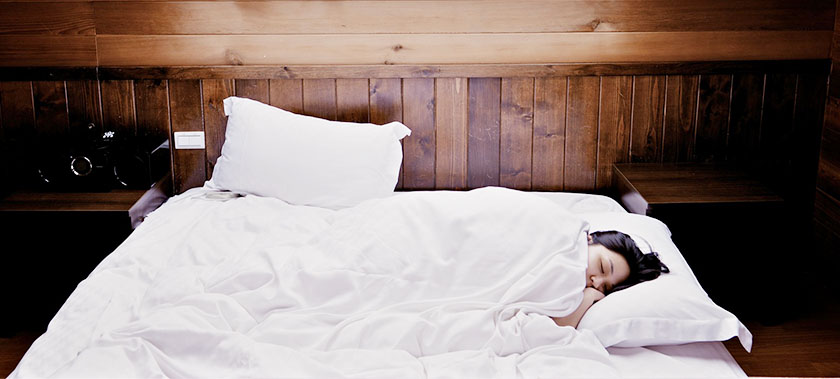Sleep Medicine
The UC Davis Neurology Sleep Medicine Clinic specializes in the evaluation of adult and pediatric sleep disorders. Proper sleep is an essential part of your overall health. There are more than 80 different recognized disorders that can affect your sleep. It is estimated that approximately 40 million Americans have a sleep disorder.
Research has shown that insufficient or poor quality of sleep may lead to significant health problems including:
High blood pressure
Diabetes
Obesity
Irritability
Heart disease
Increased daytime stress
Increased risk of motor vehicle accidents
Problems with attention, concentration and memory both at school and at work
Irresistible urges to sleep at inappropriate times (at work, in the classroom)
If you suspect you may have a sleep disorder, ask your primary care provider to make a referral to us.
Consultations with a Sleep Medicine Specialist can be arranged by calling 916-734-3588. Consults can be faxed to 916-734-7424.
The UC Davis Medical Center Sleep Disorders Laboratory is fully accredited by the American Academy of Sleep Medicine. Adult and Pediatric patients requiring an in lab sleep study, a home sleep study, or clinical sleep education are evaluated in a fully equipped sleep disorders laboratory by Registered Sleep Technologists and Registered Respiratory Therapists.
The Sleep Disorders Laboratory in the Department of Neurology collaborates with the Department of Pediatrics, the Department of Otolaryngology, and the Division of Pulmonary and Critical Care within the Department of Internal Medicine.
For more information please call:
(916) 734-0256
HOURS:
Monday through Friday
8 a.m. to 10 p.m.
Saturday
6 p.m. to 10 p.m.
A Polysomnogram is an overnight diagnostic test performed in the sleep laboratory on adult and pediatric patients. This type of sleep study provides our Board-Certified Sleep Specialist physicians with the information he or she needs to diagnose various sleep disorders. The test is done by securing sensors with water-soluble paste and hypo-allergenic tape on your head, face, chest, one finger and both legs. There is no pain involved in the placing of these sensors and the sleep technologist will explain what will be done before and while sensors are being placed on you.
During the night you will be observed by our sleep technologist for signs of various sleep disorders by monitoring brain waves, body movements, sleep position, EKG, blood oxygen levels and respiration. Treatment for Sleep Apnea can be initiated during this study if ordered by your physician.
A Multiple Sleep Latency Test (MSLT) would be performed after a Polysomnogram and is a full day procedure consisting of a series of scheduled naps used to evaluate daytime sleepiness. This study is the standard procedure used to diagnose Narcolepsy. MSLT Checklist
A Maintenance of Wakefulness Test (MWT) is a procedure used to evaluate a patient’s ability to stay awake under specific conditions for a defined period of time. This type of sleep study is used to evaluate how well someone with a sleep disorder can stay awake. This is extremely important when a person is employed in the public transportation or safety professions.
A Home Sleep Study allows you to do a limited sleep study in the comfort of your own home. An appointment is made by the sleep lab administrative team and you would be asked to come in and pick up the equipment. One of our Registered Sleep Technologists or Respiratory Therapists will show you how to apply the equipment yourself at bedtime. You will wear the device for the entire night and return the device to the sleep lab in the morning.
This type of sleep study will record your breathing, snore, respiratory effort, blood oxygen levels and sleep position. This data provides our Board-Certified Sleep Specialist physicians with the information he/she needs to diagnose Obstructive Sleep Apnea. Unfortunately, this type of sleep study is not recommended for everyone. If you have certain medical conditions including pulmonary diseases, neuromuscular diseases or congestive heart failure your physician may recommend an in-lab sleep study instead of a home sleep apnea test. An in-lab sleep study provides the most complete evaluation of your sleep.
WatchPAT 300 Sleep Apnea Test - Step by Step Video
- Insomnias
- Hypersomnia’s
- Sleep Breathing Disorders
- Circadian Rhythm Disorders
- Parasomnias
- Sleep Movement Disorders
To learn more about sleep disorders by category please visit SleepEducation.org
Sleep Health Education is a program that includes patient educational services with a focus on compliance, effectiveness, long-term treatment and management of sleep apnea.
Obstructive sleep apnea afflicts nearly 30 million adults in the U.S. Unfortunately, most remain undiagnosed and untreated.
Untreated sleep apnea increases your risk of heart failure, high blood pressure
atrial fibrillation (A-fib), hypertension, type 2 diabetes and stroke.
A patient’s provider can order an appointment with Sleep Health Education. The patient will then be scheduled for a one-on-one appointment with a Sleep Health Educator for an assessment of their:
- PAP device, mask and accessories - making sure a person has the correct equipment that fits well and is comfortable is essential to ensure sleep apnea therapy efficacy and compliance.
- A review of the patients’ therapy usage - most PAP devices are able to transmit usage data to the manufacturer’s portal. This information is analyzed by a Sleep Health Educator so that recommendations can be made to the patient’s provider.
Newly diagnosed, as well as current sleep apnea patients, can benefit from these services.
Untreated, sleep apnea puts an enormous strain on your heart by repeatedly causing oxygen levels to drop and blood pressure to surge as you sleep. It can leave you waking in the morning feeling tired, even after a full night’s sleep. Sleep apnea increases your risk of developing heart problems, and more than doubles your risk of dying from heart disease.
Fortunately, many of the damaging effects of OSA can be stopped, and even reversed, through diagnosis and treatment.
Resources:
Our Sleep Technologists are Registered by the Board of Registered Polysomnographic Technologists and licensed by the State of California. Our Respiratory Therapists are registered by the National Board for Respiratory Care and licensed by the State of California. They will set you up for the study and answer any questions you may have. They will also monitor you in the lab while you sleep.
Before the test
On the day of the sleep study, please avoid taking naps. You may maintain a normal medication and diet routine. After bathing on the day of the study please do not use hair products such as gels or hairsprays, skin lotion, face makeup, fingernail polish, acrylic, gel, or fiber glass nails as they interfere with the procedure.
What time should I arrive and what time will you wake me up?
Please arrive 15 minutes before your scheduled appointment. Wake up time is at approximately 5:00 a.m.
What should I bring to my sleep study?
Adults:
- Sleeping clothes or pajamas (two-piece without feet preferred and please no silk pajamas or gowns).
- Books, special pillow or blanket, DVDs, if desired.
- Your medications and special food needed during your stay. We do not provide food in the sleep lab.
- Your personal hygiene items and a change of clothes for the next day. The Sleep Lab provides bedding and towels. We do not have showers available.
- Please remove all hair weaves, braids and hair extensions.
- If you use a CPAP/BiPAP machine at home, please do not bring it with you. You may bring your mask if preferred for use during the sleep study but please make sure the mask is cleaned before you bring it or new in package.
Pediatric:
- Sleeping clothes or pajamas (two-piece without feet preferred and please no silk pajamas or gowns).
- Books, toys, favorite stuffed animal, special pillow or blanket, DVDs, if desired.
- Your child’s medications and special food needed during your stay. We do not provide food in the Sleep Lab.
- Toothbrush, toothpaste, diapers, wipes, etc. and a change of clothes for the next day. The Sleep Lab provides bedding and towels. We do not have showers available.
- One parent or caregiver must accompany and stay overnight with the patient.
- If a crib is needed, please inform our staff at the time of scheduling to confirm availability.
- If your child uses a CPAP/BiPAP machine at home, please do not bring it. You may bring the child’s mask if preferred for use during the sleep study but please make sure the mask is cleaned before you bring it or new in package.
When you arrive to our suite, you will be greeted by our front desk staff. You will be asked to verify your identity complete a short sleep questionnaire and sign a consent form. For pediatric visits, you will be asked to verify your child's identity and sign a consent form. Your sleep technologist will meet you in the waiting room, show you to the room and answer any questions you may have about the procedure. Set-up time varies but may take up to an hour. Six hours of recorded data is recommended. Wake up time is at approximately 5:00 a.m. for all patients. At that time, your technologist will remove all sensors and you may go home. Please note, our lab is shared during the day. Unfortunately, we cannot accommodate sleeping in. If you are being picked up in the morning, you will be asked to wait in the waiting room once the procedure is done.
What is the study designed to identify?
Depending on the results of the study, we will be able to determine if you have conditions such as obstructive sleep apnea, insomnia, night terrors or periodic limb movement disorder.
Even if you are diagnosed with one of these conditions most are easily treated with medication, behavioral changes or devices like a CPAP machine.
Will I be able to sleep with all that equipment on?
Most people sleep well. Our sensors are applied so that you can move during sleep. We understand this is not your typical sleeping environment. Our staff does their best to work around your bedtime routine in order to gather the data needed and provide you with the best possible sleep experience.
What happens the next morning?
The overnight sleep study usually ends at 5:00 am, which is when the sleep technologist will wake you up. After removing the sensors, you can expect to leave by or before 6:00 am.
What should I keep in mind during my visit?
- It important to arrive on time. If you are running late or need to cancel, please call 916-734-0256 to inform us as soon as possible.
- There is no smoking allowed on the premises.
- Do not bring valuable belongings. We are not responsible for lost or stolen items. If you leave something behind in the lab, please call our front desk during normal business hours at (916) 734-0256 to check our lost and found.
- Please silence your cell phones and avoid bright lights (phones, laptops and TV) after the study begins. We make every effort to promote the best sleeping environment for you to obtain quality data.
- If you (parent/caregiver) has OSA and use a CPAP/BiPAP machine, please inform our staff at the time of scheduling. Our Clinical Engineering team will need to check your machine ahead of time before use in our clinic. This is also required for any lift or assist devices that need to be plugged into power.
What is the study designed to identify?
Depending on the results of the study, we will be able to determine if your child has conditions such as obstructive sleep apnea, insomnia, night terrors or periodic limb movement disorder.
Even if your child is diagnosed with one of these conditions, treatment is not always necessary. Children will grow out of some of these sleep problems, and others are easily treated with medication, behavioral changes or devices like a CPAP machine.
Will my child sleep with all that equipment on?
Most children sleep well. Our sensors are applied so that your child may be able to move during sleep. We understand this is not your child’s typical sleeping environment. Our staff does their best to work around your bedtime routine in order to gather the data needed and provide your child the best possible sleep experience.
Can I stay with my child overnight?
Yes. One caregiver is required to stay in the room overnight with a child under the age of 18 but other siblings are not allowed.
Can I co-sleep with my child?
Yes. We have twin-sized hospital grade beds in each room for the patient and a bedside chair that converts into a bed for the parent or caregiver to sleep in. You may co-sleep if this is your home routine.
What happens the next morning?
The overnight sleep study usually ends at 5:00 am, which is when the sleep technologist will wake you up. After removing the sensors, you can expect to leave by or before 6:00 am.
What should I keep in mind during my child’s visit?
- Please be prepared to assist our team if your help is needed to comfort your child during the night.
- It important to arrive on time. If you are running late or need to cancel, please call (916) 734-0256 to inform us as soon as possible.
- There is no smoking allowed on the premises.
- Do not bring valuable belongings. We are not responsible for lost or stolen items. If you leave something behind in the lab, please call our front desk during normal business hours at (916) 734-0256 to check our lost and found.
- Please silence your cell phones and avoid bright lights (phones, laptops, tablets and TV) after the study begins. We make every effort to promote the best sleeping environment for your child to obtain quality data.
- If you (parent/caregiver) have OSA and use a CPAP/BiPAP machine, please inform our staff at the time of scheduling. Our Clinical Engineering team will need to check your machine ahead of time before use in our clinic. This is also required for any lift or assist devices that need to be plugged into power.
Once your sleep study is performed, it is sent to a sleep physician for interpretation. The final report is sent to the physician who ordered the sleep study and appropriate follow-up is arranged by your doctor.
The UC Davis Sleep Laboratory is located at:
UC Davis Health Midtown Ambulatory Care Center
3160 Folsom Blvd. Suite 3100
Sacramento CA 95816
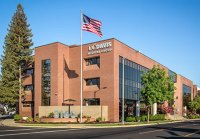
Parking Information:
Patient parking is available at the clinic. The entrance to the parking garage is located on Folsom Blvd in the middle of the building. The parking area is in the lower level of the building.
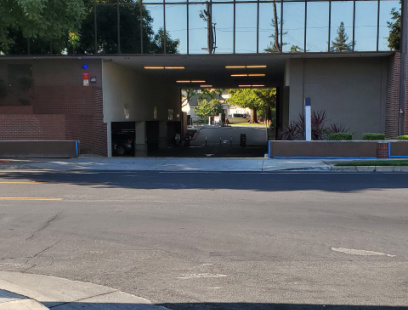
Once you have entered the parking garage you will see a sign pointing to the left that directs you toward the parking area and elevators.
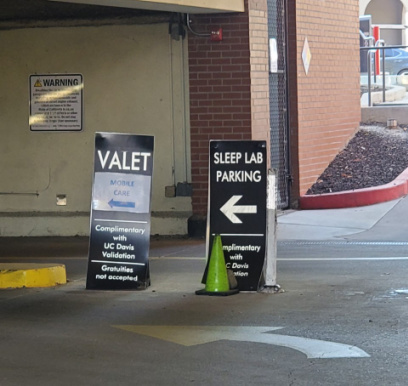
The elevators are in the middle of the garage. Please park next to the elevators. For entrance into the building, an intercom is located on the right side of the wall next to a sliding door. Push the intercom button and check in with Security. You will be asked the patient's name then buzzed in.
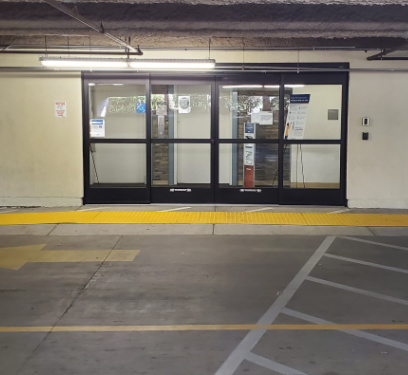
Take the elevator up to the third floor. Turn to your left and walk to Suite 3100.

